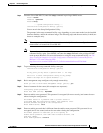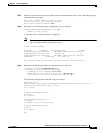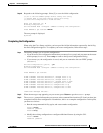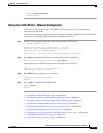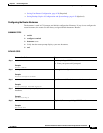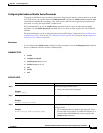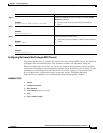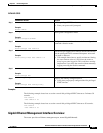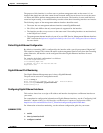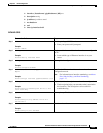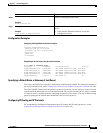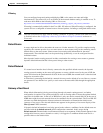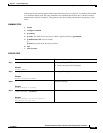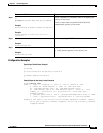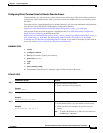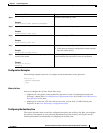
4-10
Hardware Installation Guide for the Cisco 4451-X Integrated Services Router
OL-27644-01
Chapter 4 Initial Configuration
Performing the Initial Configuration on the Router
The purpose of this interface is to allow users to perform management tasks on the router; it is an
interface that should not and often cannot forward network traffic but can be used to access the router
via Telnet and SSH to perform management tasks on the router. The interface is most useful before a
router has begun routing, or in troubleshooting scenarios when other forwarding interfaces are inactive.
The following aspects of the management ethernet interface should be noted:
• The router has one management ethernet interface named GigabitEthernet0.
• IPv4, IPv6, and ARP are the only routed protocols supported for the interface.
• The interface provides a way to access to the router even if forwarding interfaces are not functional,
or the IOS process is down.
• The management ethernet interface is part of its own VRF. See the “Management Ethernet Interface
VRF” section in the Software Configuration Guide for the Cisco 4451-X Integrated Services Routers
for more details.
Default Gigabit Ethernet Configuration
By default, a forwarding VRF is configured for the interface with a special group named “Mgmt-intf.”
This cannot be changed. This isolates the traffic on the management interface away from the forwarding
plane. Otherwise, the interface can be configured like other Gigabit Ethernet interfaces for most
functions.
For example, the default configuration is as follows:
interface GigabitEthernet0
vrf forwarding Mgmt-intf
ip address 172.18.77.212 255.255.255.240
negotiation auto
Gigabit Ethernet Port Numbering
The Gigabit Ethernet Management port is always GigabitEthernet0.
The port can be accessed in configuration mode.
Router# config t
Enter configuration commands, one per line. End with CNTL/Z.
Router(config)#interface gigabitethernet0
Router(config-if)#
Configuring Gigabit Ethernet Interfaces
This sections shows how to assign an IP address and interface description to an Ethernet interface on
your router.
For comprehensive configuration information on Gigabit Ethernet interfaces, see the “Configuring LAN
Interfaces” chapter of the Cisco IOS Interface and Hardware Component Configuration Guide,
http://www.cisco.com/en/US/docs/ios/12_2/interface/configuration/guide/icflanin.html
For information on interface numbering, see the software configuration guide for your router.
SUMMARY STEPS
1. enable
2. show ip interface brief
3. configure terminal



